As a physician scientist, I've been interested in nutrition for decades.
Both my grandfather and my father died around age 70 of heart attacks
So, I've always been keenly aware of the well publicized relationship between fats and hardening of the arteries (arteriosclerosis.) Everything I'd ever read in the past fifty years confirmed that relationship.
So, I never thought I'd have to defend that universally accepted truth.
Not eating saturated fat or not eating fats, in general, is as close to biblical truth as the medical literature gets — or so it seemed.
Not eating saturated fats (= satfats) has been a central tenet of mainstream medicine and cardiology for decades. Why am I even bothering to discuss this issue? Has anything changed? It seems so!
Just to show you where I'm headed, take a look at this large 2013 New England Journal of Medicine randomized control trial. Added fat — in the form of olive oil or nuts — reduced heart attacks and improved survival!
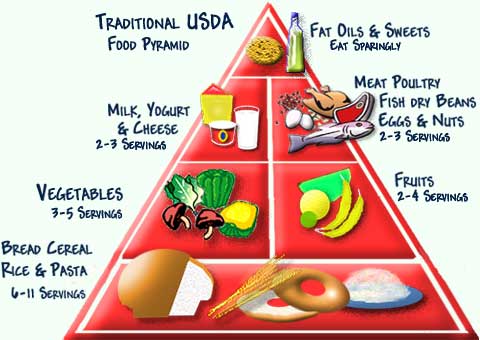
One (idiotic) version of the USDA food pyramid with bread and rice at the base.
Many of my friends are bright Silicon Valley scientists, and some have experimented with Paleo diets — eating (perhaps) like our paleolithic hunter-gatherer ancestors did.
The central claim of the Paleo movement is that we humans were thriving for millions of years eating freshly killed fish and meat. (A majority of our paleolithic ancestors did die by age 18 of infections and other causes.)
Then came the agricultural revolution about 10,000 years ago and suddenly our diets changed to wheat and barley — a diet for which we were not evolved. This sudden shift accelerated (for the worse) in the twentieth century with the introduction of packaged foods, high-frucose corn syrup, margarine and other trans fats, refined vegetable oils, Twinkies, Ding Dongs, and boom! — the resulting epidemic of massive obesity, diabetes, and cardiovascular disease.
Please note: I'm going to try to tackle two separate but related issues in this essay: 1) whether or not fats are good for you and 2) whether you should eat like a caveman/ hunter-gatherer (the Paleo diet.)
Many of the teachings of Paleo are definitely a part of mainstream medicine, and hence are non-controversial — staying away from high-glycemic simple sugars, processed foods, and trans fats, for example.
This interest in Paleo nutrition was given a huge thrust in 2007 by science writer Gary Taubes with his best-seller Good Calories, Bad Calories , which I'll discuss below.
Taubes leveled his gun squarely at carbs as the source of all our problems, and (controversially) he gave satfats a big OK. He, and the Paleo crowd, say the main culprit causing the modern world's burden of chronic disease is insulin release caused by carbs, not by fats. So, who's right? (Taubes and the paleos also take aim at imitation fats: trans fats, refined vegetable oils, and the omega-6 PUFAs. That indictment enjoys greater support by cardiologists than does the complete whitewash of satfats.)
Getting nutrition right is critical. The body is comprised of a tightly knit community of thirty seven trillion cells in dynamic equilibrium with the foods we eat. So, how should we eat to live long and prosper?
There are three, and only three, macronutrient food groups — carbs, fats, and protein .
Let's suppose you eat 2400 calories a day. Given a fixed amount of protein, let's say 400 calories worth (100 grams), then the central question of this essay is — where should the other 2000 calories come from: carbs or fats? (I also deal with the crucial issue of whether eating 2400 calories a day is good for you or whether you're better off eating less.)
Mainstream medicine has traditionally spoken with one voice on this topic: most of those remaining 2000 calories should come from complex carbs, specifically whole grains, fruits, and vegetables. (That includes the second tier of the USDA food pyramid (in its traditional form) shown above.)
The base of the food pyramid shown above — 6 to 11 servings of bread, cereal, rice, and pasta — is so brain-dead that it really calls into question the epidemiologic scholarship (and commercial bribes) prevalent in the 1960s and 1970s. Anybody who's tried to diet knows that that stuff should get dumped first — right after the candies, cookies, cakes, pies, rice, potatoes, and breakfast cereals.
The Paleo authors — here I'm including Gary Taubes and Loren Cordain (and his many disciples)— correctly dispute the wisdom of the pyramid shown above. More controversially, they also argue that perhaps half or more of the remaining 2000 calories should come from fatty foods like meat, fish, eggs, nuts, and seeds. (Taubes and some paleos also favor lots of dairy.) Taubes and many Paleo advocates inspired by Cordain's work — Professor Cordain himself seems more circumspect — feel that saturated fats have been falsely accused of causing atherosclerosis, the grim reaper of the modern world.
So, who's right? That's my focus. And, what should you be eating for optimal health? At the conclusion of this essay, I'll show you in detail what I eat having read all the recommendations.
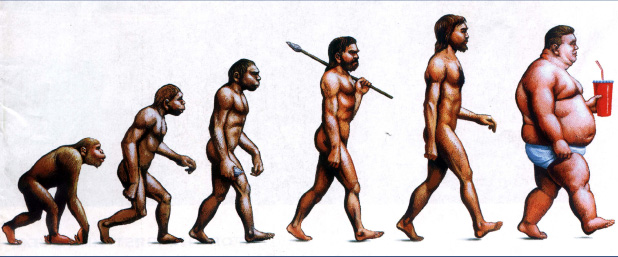
If you eat 11 servings of bread, white rice, breakfast cereal, and pasta and too much fruit, you'll look like the guy with the supersized drink.
As a physician for many decades, the saturated fat claim made by the Paleo advocates initially struck me as being preposterous and even dangerous. It flies in the face of a half century of medical dogma portraying satfats as the chief villain promoting atherosclerosis. But could there be a grain of truth in the claim made by the Paleo crowd?
For me finding out the truth was absolutely essential.I found out serendipitously about a decade ago that I already have early atherosclerotic calcifications in my coronary and carotid arteries — despite a lifetime of vigorous exercise and attention to diet. Although I've never had any symptoms, and I blast up 12,000 foot Sierra peaks every summer, my carotid ultrasound and coronary CT scan said that trouble was lurking. If you have risk factors and you're a man over 45 or a woman over 55, I heartily recommend those tests. If you have to cancel your cable tv for six months to pay for it, do it anyway! It may save your life.
In the course of an extended correspondence over several months, I examined hundreds of online articles, studies, and videos that address the satfat = saturated fatty acid issue. (Special thanks to my brilliant friends, scientist/engineers Steve Omohundro and Dan Hunter for their many contributions.) It was also a great delight to discuss this with my son, Sean, a budding, cell biology/ bioinformatics guru.
My purpose in writing is to share with you the many excellent online videos and articles I've found, and to give you some take-home lessons.
By the way, I'm not an expert, but the researchers in the videos are. Watch their lectures and draw your own conclusions. You cannot get through all this in one day. So, right now — I mean now! — tape a note to your refrigerator reminding you to watch every video. It's all free. Why not? Your doctor cannot make you healthy; only you can by what you do everyday.Here's another reason to watch all the videos - the recommended foods span the spectrum from pure vegan (my preference) to bloody carnivore + lard + dairy. You need to appreciate the history and evidence (or lack thereof) behind all the various recommendations.
If you can't stand the suspense, here's my summary.1) What really matters is achieving your optimal weight — thin (but not too thin) — a bmi of 20 to 22) with a nutritious diet.
It seems that a bmi under 20 may not be good. That gives you no fat reserves if you get sick. But also a normal bmi of 24 may not optimize your lipid panel, but it's a start. Being obese may be a killer. And, being sedentary is also bad — daily exercise is important.
(The evidence, however, does not support running marathons as the path to cardiovascular health and longevity.)
2) Calorie Restriction with Optimal Nutrition (CRON)
There's abundant evidence that calorie restriction helps prevent cardiovascular disease. It's also the only intervention shown in many species to extend lifespan. (But, what do you eat to make it possible? It simply won't happen if you try to do it just by eating lettuce and weak tea, unless you're in a prison camp.)
3) Protein should range from about 1 gram to 2 grams per kg per day — no more than say about 60 to 160 grams per day (that's the weight of the protein, not the fish) — say, a portion of meat or fish about the size of your palm per day. Some body-builders and athletes go up to 2 grams/kg per day. Excess protein may lead to gout and acidic urine resulting in renal stones. (I know!)
These articles by Laura Dobson on About.com are clear and accurate. She discusses recommended protein in your diet, and quantity of protein based on lean body mass, and gives us a body fat calculator. To calculate bmi, you just measure your waist, neck, and height.
4) Fast carbs (like sugar) promote weight gain and need to be greatly curtailed — initially, even including fruit! Fast carbs are high-glycemic index carbs. They promote insulin release and fat storage. To lose weight you must dump them. Even "good" carbs like oatmeal may cause spikes in your blood sugar.
5) Fats make it easier to eat less. They suppress insulin release and kill your appetite. Suppressing your appetite is critical. So is staying away from food, restaurants, and TV snacks. (There is a huge psychological dimension to over-eating!)
Fats, in general, promote weight loss (yes, weight loss!) — a paradox. (The real issue though, is whether you're thinner and healthier or thinner and dead .)
6) Trans fats are horrible They're more atherogenic than satfats. They were invented by the food industry to increase the shelf life of food — the thousand year old Twinkie! They need to be buried with the people they killed. Shop from the outer aisles of the supermarket. Avoid everything in a box or at least read the label!
7) Satfats need to be limited, but replacing all satfats with simple carbs (possibly even fruit in excess) may be worse and is the path to weight gain, obesity, and disease. Exactly what foods people eat, as they have striven to replace satfats, has created an impenetrable fog in the medical literature. The issue is incredibly complex.
The safety of satfats depends on the particular molecular species and dose in your diet.
8) Replacing satfats with PUFAs (and probably MUFAs) is probably better, but this also depends on the type of PUFA (omega-3 is best) and MUFA (oleic, as in olive oil, is best). (Simply put: eat fish rather than meat, and eat olives or avocados rather than cream.) The weight of the evidence supports limiting satfats .
I consider the total exoneration of satfats by some bloggers and tv gurus — who recommend unlimited dairy — to be unsupported and irresponsible, despite this oft-cited 2010 AJCN study.
Mediterranean fat sources (PUFAs and MUFAs — fish, olives, and avocados — may be better for you than satfats.
9) Only those researchers who advocate an extremely low fat, high complex carb diet, have demonstrated that coronary artery atherosclerosis can be reversed .
I personally will only believe the high satfat advocates when they've also done similar trials. A vegetarian diet may be the best way to prevent atherosclerosis, and only vegan diets have been shown to reverse atherosclerosis without statins.Vegetarians (for example, Seventh Day Adventists) have demonstrable longevity. It's also good for the animals and for the planet. (I myself have tried complete vegan diets occasionally. Somehow, it's always a no-go. But note, I'm talking about the published evidence, not what I do or recommend.)
10) Celiac disease is far more common (1% of Americans) than traditionally supposed.
Irritable bowel syndrome (IBS) is quite common. Wheat, barley, rye (but not rice) and also soy and legumes may need to be restricted to curtail IBS. Even fruit may need to be restricted to avoid obesity (and IBS.)
11) Fish or supplements containing DHA and EPA should be a part of everyone's diet.
Increasing omega 3 fats (fish or flax seeds) and decreasing omega 6 fats (vegetable oils) is crucial to brain health and to reducing the inflammation that contributes to a variety of chronic diseases. Get rid of salad oils (except olive oil) and most salad dressings.
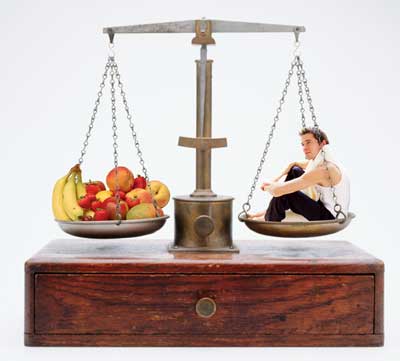
You're not gonna lose weight by eating all that fruit. Big, fat error!
That's the summary. Now on to the articles, the evidence, the videos, and what I eat.
My dietary goal is longevity — to live as long as possible.
Why? As a lifetime science and technology buff, every day brings exciting new developments. What incredible biomedical advances await humanity by 2030 and beyond? I want to stick around to find out.
Of course, that's not the objective of everyone's diet. Some young men, for example, want to increase muscle as fast as possible. Some people love going to fancy restaurants or eating exotic cuisines.
My exclusive interest is optimal health and longevity.
I'll start with the view of mainstream medicine and focus on just one problem.
Dietary advice from every medical, scientific, and nutritional society must first and foremost focus on the prevention of atherosclerosis.
It's the number one killer in developed countries, exceeding cancer and infectious diseases combined. ( The definitive American source for info is the CDC, which publishes the annual statistics yearly in Circulation . )
Here are the mortality statistics for the USA, source: CDC, year 2009
2009: total deaths 2,436,652 — roughly one percent of 300 million Americans
Adding heart disease and stroke (most often caused by atherosclerosis), we get 727,210 deaths per year in the USA in 2009 — about a third of all USA deaths. It kills both men and women, although men get it (and die from it) about ten years earlier than women. Visit a senior residence (old folks home), then ask yourself, where are all the men? Answer: almost all have died.
Atherosclerosis is the process in which arteries of the heart or brain plug up over decades, leading to a sudden heart attack or stroke in the brain. Diet (and fat, in particular) has been implicated as a major contributor to this process. (But exactly which foods are the villains is, of course, the focus of this discussion.)
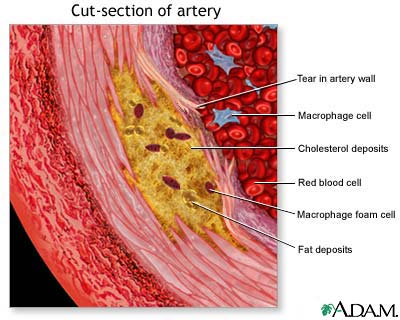
ruptured atherosclerotic plaque
After the fibrous cap on the fatty plaque has ruptured, a blood clot forms.
This 3d animation shows in great detail how the plaque forms .
How and why does plaque form in the arteries? After decades and billions of dollars in research, the answer is still being worked out. But, here's the most widely accepted mechanisms:
a) if LDL = low density lipoprotein cholesterol (ie, bad cholesterol) is persistently high,
b)it becomes oxidized and deposits underneath the endothelium (the inside lining) of arteries.
c) There it is gobbled up by macrophages ( big eaters), whose bloated corpses are foam cells: fat deposits in the arteries.d) Over the years, these fatty deposits, push the outer wall of the artery further out. e) At the same time the foam cells cause the smooth muscle cells in the endothelium to secrete collagen to form a dense fibrous cap (scar tissue) that narrows the blood flow channel in the artery. f) if the process continues, inflammation inside the fibrous cap may weaken it such that the blood flow suddenly lifts it up. g) As a result, a blood clot forms that completely closes off the artery, cutting off blood flow to the heart muscle. i) Deprived of oxygenated blood, the heart muscle dies (a heart attack). (When this process plugs up the carotids, the result is a stroke (death of neurons).
While these processes are the widely accepted cause of atherosclerosis — the leading cause of death — researchers place more or less emphasis on differing parts of the atherosclerotic mechanism.
While high triglycerides and LDL-cholesterol have clearly been implicated as "bad guys" and HDL-cholesterol, which (supposedly) carries cholesterol out of the plaque, (may be) one of the "good guys," even when they are taken into account, a lot of disease still remains unexplained.
This fascinating video shows the the daunting complexity of the transmembrane migration of inflammation-mediating cells .Some authors in the popular press - notably science writer Gary Taubes and biochemist Mary Enig — have questioned the role of dietary fat in causing atherosclerosis, as I mentioned above. (Wikipedia nicely summarizes the saturated fat and cardiovascular disease controversy . I'll discuss the evidence cited by the skeptics toward the close of this article.
However note: they are vastly out-numbered by the believers. But, how many skeptics does to it take to prevail — only one, if he or she is right. Every scientific theory can be overturned by sufficient evidence. We're talking science, not religion.)
Now, on to the experts, what they recommend, and why.
I'm going to start with Loren Cordain, because of all the videos I've seen, his most convincingly presents the big picture: what humanity ate (probably) while we evolved over millions of years in Africa, and the problems created by our post-industrial, Western diet.
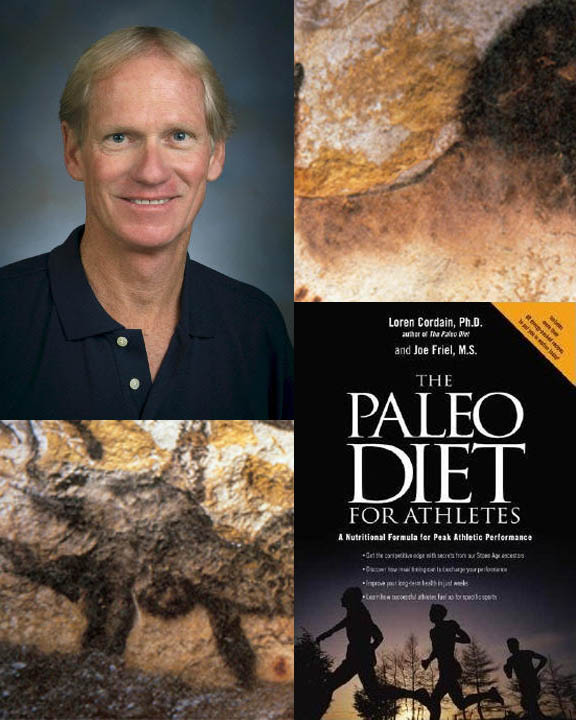
Loren Cordain: Master of Paleo
( Note: this is our first must-watch video — just click the links — it's all online and free. )
My favorite Paleo advocate is Professor Loren Cordain of Colorado State University. This one hour YouTube video of Prof. Cordain gives the complete rationale for Paleo nutrition.
Cordain did much of the paleoanthropologic research that provides the evidence for Paleo eating. Whether or not you believe that Paleo eating is nutritious (or harmful), his presentation on the history of human foods is a must. He, as much as anyone, claims to know what our ancestors ate, and also what present day hunter-gatherer (HG) societies eat.
He analyzed data on 229 HG societies: 2/3s of their calories come from animal-based foods. (Whether eating that way promotes longevity is, of course, an entirely separate question — I say, No!)
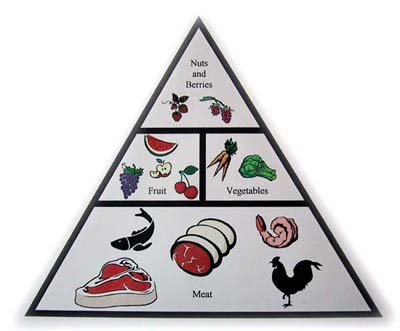
The Paleo Pyramid has fish and meat at its base. Dairy is not part of it.
So, what did our ancestors (and present day hunter-gatherers (HGs)) eat?
Answer: everything! Whatever they could get their hands on.
They and we are omnivores. Eating by us (and by almost every creature) is determined by calories obtained versus effort expended.
Grains? Forget it! Ancestral grains were scrimy, indigestible weeds prior to agriculture (and horticulture) 10,000 years ago. Fruit? Fine! But these were also apt to be small, wild varieties, not giant juicy apples. Vegetables? Same comment.
Fish? Played a large role in our ancestral diet and that of many modern HGs. Animals? Cordain shows that wild animals and fish form about 2/3's of the diet of modern HGs. If you lived in Northern Europe during the glaciations, you ate like the wolves and other predators.
But, he shows the difference between wild venison (pure meat) versus a factory farm steer (loads of fat) . The cavemen were slim, as were the animals they ate.
Dairy? Here, Cordain disagrees with the recommendations of his young disciples some of whom advocate unlimited saturated fats from cheese, cream, butter and animal fat.
They're on thin ice. Their evidence is preliminary and controvertible. As Cordain points out, the paleolithics did not have access to dairy before animals were domesticated . He shows an angry wildebeast:just try milking that!
Sugar: Fructose: Fast Carbs
Here Cordain and the medical establishment are in total agreement. Our ancestors rarely ate simple sugars (simply because they weren't available (other than honey)).
Consumption of these sugars has gone through the roof in the past hundred years, hitting 150 pounds per person per year recently . Sweet death from obesity, diabetes, and cadiovascular disease.
I linked to Loren Cordain's lecture first, because 1) it's essential to understand humanity's ancestral diet, and 2) I agree with his list of the problems created by the modern Western diet.
However, look at all that meat, fish, and fat in the Paleo diet he recommends.
Won't that lead to atherosclerosis, heart attacks, and strokes? The vegetarian advocates say it will. We'll try to decide who's right later.
After reading scores of articles and books, I found it hard to ignore the evidence presented by the vegetarian advocates. These are physician researchers who have studied the issue over decades, and who have come to a simple conclusion: to avoid heart disease and strokes (and to reduce cancer risk), eat mainly a vegetarian diet (if you can).
My favorite video, The Last Heart Attack was made by Dr. Sanjay Gupta , a professor of neurosurgery at Emory University and best known as CNN's chief medical correspondent.
This free, one hour video is mandatory viewing for all my readers . Did you put a note on your refrigerator to watch these? If not, do it now!
In this video Dr. Gupta interviews former President Bill Clinton, among others. Clinton had a four vessel coronary bypass in 2004. Then, in 2010 he had two coronary stents placed.
That second coronary intervention forced Clinton to really get serious about his diet. Here is Bill Clinton explaining his diet to comedian David Letterman (who in 2000 also had a five vessel bypass.)
For dietary advice Clinton turned to physicians Dean Ornish and Caldwell Esselstyn.
I've been a fan of Dr. Dean Ornish for years. Both Dr. Ornish and Dr. Esselstyn have worked for decades with patients (including Bill Clinton) who've had heart attacks.
Both physicians have demonstrated by angiography that their 100% vegetarian, very low fat diets, can arrest and even partially reverse coronary atherosclerosis. This was formerly thought to be impossible.
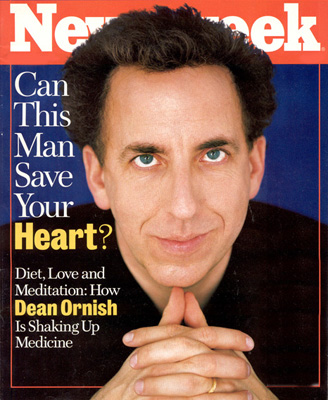
Here is Dean Ornish in a TED video Help the Body Heal Itself (another of my favorites).
And, here's his argument in just a 3 minute TED Talk.And, here's his website: PMRI, the Preventive Medicine Research Institute.
Besides eating vegetables, Dr. Ornish also advocates stress reduction and meditation. It takes huge motivation and self-control to eat a 10% fat diet, but Ornish has decades of data and publications to show that it works.
Next, among the vegetarian advocates is physician Caldwell Esselstyn .
Like Ornish, he has worked for decades with patients (including Bill Clinton) who've had heart attacks. He has shown that he can arrest and partially reverse their disease.
President Clinton turned to both Ornish and Esselstyn after his second heart attack in 2010. Clinton is now a vegan (only vegetables: not only no meat, no chicken, no fish, but also no dairy, no eggs, no avocado and no nuts!).
Is it hard to adhere to a diet that low in fat? You bet. But like Yoda in Star Wars , Dr. Esselstyn hates moderation: do not try - do! His article is a must-read Resolving the Coronary Artery Disease Epidemic through Plant-Based Nutrition. And here is Dr. Esselstyn in an 8 minute video.
Dr. Joel Fuhrman is another physician who strongly advocates a vegetarian diet.
He presents his case in this brief video on fats and micronutrients . I also read and recommend his carefully documented best seller Eat to Live , 2nd edition 2011 .
Like Ornish and Esselstyn he has worked with hundreds of patients with heart disease, obesity, metabolic syndrome, and adult diabetes and reversed their disease. His book, papers, and website present the argument. By the way, Dr. Fuhrman was a world champion figure skater in his youth.
I also read biochemist Colin Campbell's book The China Study , which compares provinces and cities in China in which meat is eaten to those on a vegetarian diet.
This study, which received NIH funding for three decades, carefully documents the salutary effects of an all vegetarian diet. Campbell presents abundant evidence that shows a strong atherogenic effect of a diet rich in animal fats but, surprisingly, also a strong carcinogenic effect.
His conclusions are even more compelling considering his background: growing up on a dairy farm in the Midwest. Only the power of his study data persuaded him that vegetables are the way to go.
In this video Dr. Campbell presents the China Study .
Both he and Dr. Esselstyn are in their late seventies and look terrific.
My favorite website on vegetarianism is VegSource.com
I discovered it after noting that several of the videos above were posted by VegSource on YouTube.
(See this great collection of videos from VegSource.)
Another crucial part of vegetarianism is how animals are processed on the way to your dinner table. Here's an interview with comedian Ellen Degeneres about why she's vegan . In it she recommends the movie Earthlings , commenting that it made Food Inc (another similar movie) seem like a Disney production. It does.
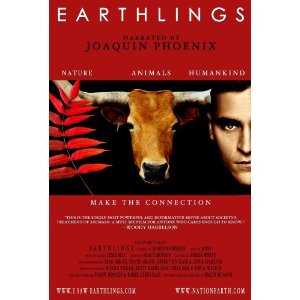
Earthlings is a (free, online) hard-hitting documentary about the cruelty inflicted on factory farm animals .
My reaction was how could I live seven decades in America and not be aware of this story.
It needs to be seen by everyone who eats meat. Narrated by Joaquin Phoenix, it's a riveting account. (That's not to say that it's 100% accurate, but it's a sad indictment of our supposedly free society that the monstrous treatment of factory farm animals has been so hidden from view.) If you believe that farm animals are conscious (they are!) , then their welfare is crucial.
Calorie restriction (CR) is spectacularly successful in decreasing the rate of atherosclerosis, diabetes, and perhaps even cancer.
A 2004 study in the prestigious journal PNAS, reported a sixz year study of eighteen people on a calorie-restriced diet (bmi 19.6) compared to controls with normal BMIs (average bmi of 26).
The calorie restricted group ate only 1,100 to 1,950 calories per day vs 1,975 to 3,550 per day for the controls).The restricted group had spectacular reductions in their LDL cholesterol and triglyceride levels. Notably, they experienced a forty percent reduction in their carotid intima media thickness (IMT) — a direct measure of atheromatous plaque.
The many benefits of calorie restriction are touted on the CR Society website . This wikipedia article on calorie restriction is comprehensive. I became interested in CR perhaps 20 years ago when I read a book by renowned physician Roy Walford, a professor of pathology at UCLA and a noted pioneer of CR research.
His research, since replicated in many species, showed that mice fed a calorie-restricted diet almost doubled their lifespan.
The health-inducing effects of CRON were confirmed in a crucial 20 year study on rhesus monkeys reported in Science in 2009 . That study showed a marked decrease in diabetes, cancer, heart, and brain disease. It appears that the voracious eaters are dying at a rate three times as fast (total of 14 dead) as the dieters (5 dead).
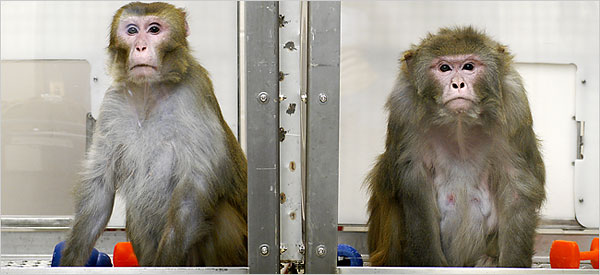
The monkey who ate to his heart's content is on your right.
A new study of calorie restriction in humans was begun in 2007. The new NIH study, called CALERIE is being conducted at three medical centers and has about 250 participants. It's a two year study that completed enrollment in February 2010. A preliminary study reported in 2006 showed reduced levels of insulin resistance, reduced LDL, and less oxidative damage to DNA. CALERIE is described here in wiki .
Another potential benefit of cutting calories is improved cognition and memory, reported here in PNAS in 2009 and also in the New York Times .
Okinawan Diet of the World's Longest-Lived People
One journal article on the Okinawan Diet provides key support for a calorie-restriced, vegetarian diet. Okinawa is one of Japan's islands, known to Americans because of our military base there. The Okinawans are among the world's longest-lived and healthiest people. In modern times, their diet has shifted toward a more western (higher calorie, higher fat) diet, but the authors of this study looked back several decades at how much and what they used to eat.
Their diet is listed in Table 1 on page 443 of the study. It has a total of 1785 calories per day from 1262 grams of food for a calorie density of 1.4 - that's really low. 85% of their calories are from complex carbs; 9% from vegetable protein; and only 6% from fat. (Look at a bottle of supposedly healthy olive oil (or any other oil). It has 9 calories of fat per gram of oil. (A past version of the USDA's Food Pyramid had healthy oils at the base. Forget it! Fortunately, that's no longer recommended.)
Here's what the Okinawans eat: 69% of their diet was sweet potatoes; 12% from rice; 7% from other grains; and 6% from soy dishes. There was almost NO meat, no dairy, no eggs, no animal fat, no sugar, no nuts, no seeds.
Their longevity and diseases were studied in the Okinawa Centenarian Study . Okinawa has an unusually large centenarian population , and they are remarkably disease-free. Their death rate from coronary heart disease is the lowest in the world at 18 per 100,000 (compared to America at 100 per 100,000) and their rate of cancer is 2/3's of ours.
Saturated Fats: Killers or Saviors
So, let's return to the question that started this article and initiated my recent exploration of this literature. Are saturated fats killers or saviors?
The above literature would seem to leave little doubt. Too many calories of food and of saturated fats, in particular, are killers. That partially explains the heavy predominance of anti-fat statements in the wiki article entitled saturated fat and cardiovascular disease controversy. The article accurately conveys the views of the medical academic establishment, the American College of Cardiology, and the American Heart Association: fat is bad. The so-called 'controversy' has arisen only in the popular press and as a result of publicity efforts by dairy producers, oil producers, and meat producers.
But, lest we be hasty, it's wise to consider the arguments and evidence brought forth in favor of saturated (and unsaturated) fat. As you will see, they do have a role.
For that let’s return to Gary Taubes whose 2007 book Good Calories, Bad Calories was a best seller and created a firestorm. I'll summarize his arguments starting with the least controversial (most generally accepted) and end with his most controversial positions.
By the way, Gary Taubes provided a springboard and popular voice for the Paleo movement — those writers and bloggers who advocate eating more meat and virtually unrestricted saturated fat. Here I’m lumping together Taubes and the Paleo advocates for now. (Loren Cordain, as we’ll see below, is quite clear — dairy products were NOT a part of the paleolithic diet. Whether they are healthy to eat is a separate question.) In common with academic medicine, Taubes strongly condemns fast carbs — those easily digestible, refined carbs that are a huge part of the American diet: cookies, cakes, breakfast cereals, etc. Those high glycemic foods stimulate insulin release and are converted to fat. He rightfully condemns high-fructose corn syrup as being a key contributor to our current epidemic of obesity.
Now, on to the controversial positions. Taubes attributes the high incidence of atherosclerosis in Europe and America not to a high intake of saturated fat but rather (and exclusively) to our high intake of carbs including starches. In his view insulin release is the universal culprit, and it is only provoked by carbs and not by fats or protein. He believes that America has been grossly misled by the medical establishment: in his view, carbs are the real culprit, not fats.
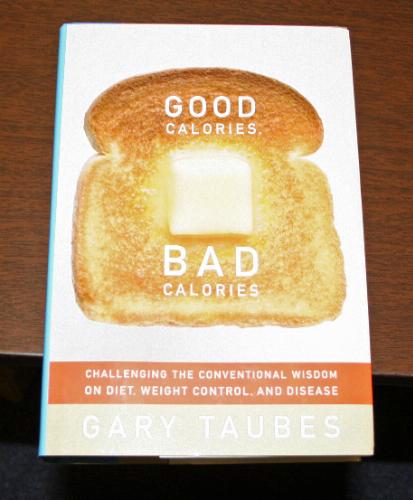
And finally, his most controversial positions: 1) Chronic diseases like atherosclerosis are caused exclusively by refined carbs and starches and not by fats. (The Paleo gang blames inflammation and not fats.) 2) The following foods can be eaten without restraint: meat, fish, fowl, cheese, eggs, butter, and non-starchy vegetables. Really? 3) Consuming excess calories does not cause us to grow fatter. 4) The obesity epidemic is not due to overeating nor to our sedentary lifestyle.
While these positions seem ludicrous (especially considering the mountains of evidence presented by the vegetarian and CR advocates, there is a grain of truth in some of them - just a grain. (taken out of context, they are each grossly inaccurate.)
Is atherosclerosis caused by fats or by carbs? The answer is probably both, when consumed in excess. A) Decades of evidence have correlated saturated fat with atherosclerosis. B) However, the recommendation that was advocated by the USDA in the 1960s and 70s to replace fats with pasta, bread, and cereal is dead wrong. (The USDA is so heavily influenced by food industry lobbyists that it must be ignored.)
Being a lifetime athlete, I was intrigued by Taubes' position on the futility of exercise as a means of weight loss. He argues that appetite is tightly controlled by the brain. In the course of a year, we take in literally a million calories and burn the same. Obviously, calorie expenditure must be about equal to calorie consumption. When you exercise, you just eat more to make up for it. It's really hard to lose weight just by exercising. Everybody knows that. Score one major point for Taubes. You can bust your fanny on the treadmill, but if you eat tons of fruit and pasta afterward, your weight is going nowhere but(t) up.)
However, the combination of Taubes' positions, is where his argument breaks down. You cannot just sit in an easy chair and eat an excess of anything and expect to lose weight or be healthy.
My lifestyle every August is the closest I come to a paleolithic style: backpacking for weeks in the Sierras. There are no grocery stores, no refrigerators, no cars, no pantries, no tv or internet. Every meal is a job; every bottle of water means finding a lake or creek. Dairy foods, which spoil, are non-existent. The real Paleo lifestyle is hard work; every calorie counts.
One unusual feature of my Sierra hiking trips is that I frequently encounter Seventh Day Adventists, and I enjoy discussing health issues with them. The Adventists are vegetarians, and their health greatly benefits as a result. There have been several studies demonstrating a salutary effect of the vegetarian diet practiced by Adventists. (We also discuss - but don't agree on - who or what created the Universe. But we do agree that the natural world needs to be preserved at all cost .)
By the way, almost no one recommends eating more than about 2 grams of protein per kg of body weight per day — say, a quarter pound - about the size of your palm. At four calories per gram, if you eat 100 grams of protein, that's 400 calories.. The real question is this: if your diet is (NOT should be) about 2,400 calories per day, then what should make up the remaining 2000 calories: complex carbs or fats?
Again, here's an interim summary of what I've read (coupled with my own experiences). 1) it's very important to achieve your ideal weight (for me, that's a bmi of 22 (weight 150 lbs at a height = 5' 10;). It's hard work. 2) Getting rid of fattening snack food is crucial. It cannot be in your house. That includes fruit! Modern fruits - grapes, oranges, apples - are just giant sugar bags. Get rid of 'em. (First dump the cakes, cookies, cereals, bread, and pasta.) 3) Eat whatever kills your appetite. What it is exactly, probably doesn't matter much. Sardines, a giant salad or plate of vegetables (but not grease-soaked french fries). 4) No mindless eating: sitting is one thing but watching tv or a movie and mindlessly shoveling calories of any kind is bad.
That's where Dean Ornish's mindfulness comes in. You should be aware of every bite. Is it bringing you closer to life (lower weight) or closer to death (promoting atherosclerosis)? 5) If you're eating a calorie-restricted diet and are at your ideal weight, does it really matter whether ten percent or thirty percent of your calories are from fat? Possibly not, according to Taubes; Ornish and Esselstyn would say, it DOES matter if you want to reverse heart disease. (I take Lipitor and say bless you, Pfizer! The bloggers who rail against it are ignoring hundreds of studies showing that statins reduce heart attacks and strokes.)
Where do people trip up with what they eat? Do your own research in the supermarket. I can tell by looking at a shopper, what will be in his or her cart. But let's return to the issue of fat consumption.
Fish, Fish Oil, and Omega-3 Fatty Acids
This is a crucial part of the story not only for weight loss but also for reduction of cardiovascular disease and a host of other problems including depression and cognitive impairment.
The most authoritative authority on the topic of omega-3 fatty acids is Professor Bill Lands, a renowned NIH researcher, who did the original studies that showed exactly why omega-3s are beneficial. Why not hear the argument straight from Prof. Lands, as he lectures military physicians at the NIH. This is a four-part YouTube video that totals about 40 minutes. Note that omega-6 fatty acids directly compete with omega-3s for entry into your cell membranes.
The bottom line is that the Western diet includes far too much omega-6 fat by a factor of ten. It's in all our salad dressings (including olive oil), in peanuts, and peanut butter, and in lots of packaged foods. Omega-6s are pro-inflammatory and contribute to heart disease, stroke, and an array of common diseases. Lands refers to omega-6s as the insurgents (like the Taliban), while lecturing to the cadets.
Omega-3s, in contrast to omega-6s, are benign bystanders (peaceful villagers). They are anti-inflammatory . Our cell membranes and tissues are directly composed of what we eat, and we Americans are loaded with omega-6s from our diet.
Take a look at this graph that Prof. Lands uses in his lectures. It shows
a direct correlation between cardiac death and the pro-inflammatory
omega-6 fat, arachidonic acid. You could just as well graph lack of fish intake and cardiac death.
Eat fish! Dump vegetable oils and anything that contains them. 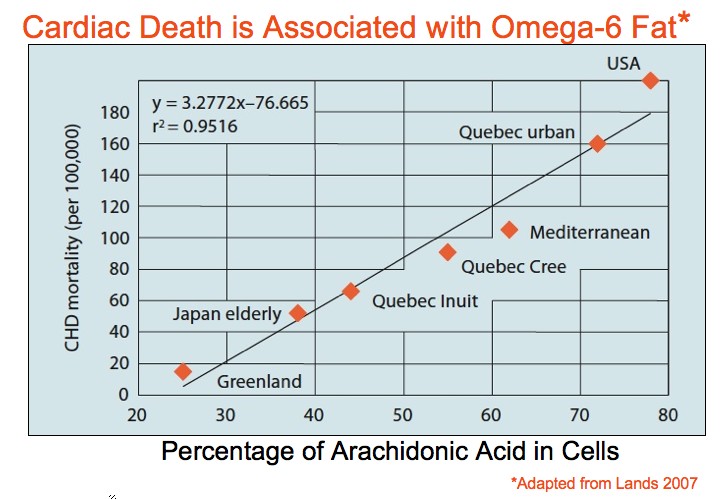
I also recommend these brief videos by Dr. Joe Hibbeln, a principal investigator in Nutrition and Psychiatry at NIH, extolling the virtues of omega-3s and DHA for improving mental health, specifically alleviating depression and cognitive impairment: Omega-3s for Brain Health, and Joe Hibbeln Part 1 - also listen to part 2.
Look at the white matter in the brain below. It is white because it is almost entirely made of fat: the phospholipids and sphyingolipids that make up the myelin sheathes that surround your one million miles of neural axons. That insulation, which surrounds the cables, is directly composed from the cell membranes of brain oligodendrocytes. How long it lasts is determined by the fats in your diet, DHA in particular. The richest source of omega-3s and DHA is fish. (My mother used to say, " fish is bene-fish-al ." For vegans, the best source of omega-3s is flax seeds.
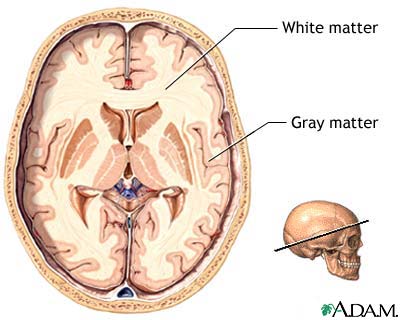
In their book The Perfect Health Diet , Paul Jaminet (a physicist) and his wife Janet (a PhD biochemist) take the highly controversial position that saturated fats may be eaten in unlimited amounts without causing harm.
Needless to say, that's a conclusion I have a hard time swallowing. But, their presentation draws extensively from the medical literature.
They also present evidence against eating four groups of foods they consider toxic: a) wheat and other cereal grains, b) legumes - especially soy beans and particularly the textured vegetable protein found in so many imitation meat products, c) liquid vegetable oils like corn oil, soy oil, and safflower oil, and finally d) fructose, especially high-fructose corn syrup.
Let's first consider their evidence that saturated fats are not the villains that cause atherosclerosis — that's their position, not mine.
A 2011 study that appeared after the Jaminet's book came out serves to drive home their point and is similar to several other studies exculpating satfats. This 2011 study appeared in the American Journal of Clinical Nutrition. The senior authors, Professors Frank Hu and Ron Krauss, are two of the top scientists in this field.
This was a meta-analysis of 21 separate prospective studies evaluating the association of satfats with cardiovascular disease. The authors found no association! Say, what? No association?
After decades of epidemiologic, clinical, and animal feeding studies showing a consistent atherogenic effect (or at least an elevation of biomarkers like cholesterol), how is it that a study that combines twenty one separate studies including over 348,000 patients shows no association?
My belief, shared by critics of the study and certainly by the likes of Gary Taubes, is that when you eat less of one food (like saturated fats), you eat more of something else. Exactly what that something else is (the replacement food), matters considerably. Replacing saturated fats with trans fats, for example, is definitely worse. Furthermore, it seems that replacing saturated fats with simple carbs is not helpful and may even be worse. That is my guess, but whatever the reason, this lack of association is a stunning result.
But, that lack of association between satfats and atherosclerosis would come as no surprise to Sally Fallon (or colleague Mary Enig), who presents her argument in this video called The Oiling of America . The video claims that the real perpetrators of atherogenesis are imitation foods (shortenings, margarines, refined vegetable oils, trans fats, fast carbs, and other staples of a Western diet). She also tells a fascinating story of the influence of the food industry and medical orthodoxy in distorting the truth. Her video is worth watching and contains important truths.
Like Sally Fallon, I strongly believe that imitation foods are atherogenic. However, I don't believe that that exonerates satfats. The evidence that they are atherogenic is too abundant to ignore. The evidence that statins like Lipitor prevent atherosclerosis and lessen coronary heart disease is also overwhelming. (I take Lipitor, and I'm not about to stop. There are hundreds of papers showing that statins prevent heart attacks. In this 2011 NEJM study high dose statins were shown to cause regression of atheroma volume .)
So, before you start swilling cream, consider another paper from AJCN in 2011 that includes two of the same senior authors from the "no association" study: Hu and Krauss. This is a "white paper," a consensus document that tries to lay out definitively where the issue stood in 2011. Interestingly the meeting was paid for by the national dairy councils of several countries. Despite that, the consensus leaves little doubt about the vast weight of the evidence.
Here are some key points from their abstract. 1) the evidence from epidemiologic, clinical and mechanistic studies is consistent in finding that the risk of CHD (coronary heart disease) is reduced when SFAs (satfats) are replaced with PUFAs. 2) In populations who consume a Western diet, the replacement of 1% of energy from SFAs with PUFAs lowers LDL cholesterol and is likely to produce a reduction in CHD incidence of > 2-3%. 3) No clear benefit of substituting carbohydrates for SFAs has been shown.
So, there you have it. The conclusion reached by the world's top nutritional epidemiologists: replace satfats by PUFAs.
But note: that does NOT mean that substituting corn oil for beef is helpful — it is not. As Bill Lands pointed out above, omega-6 PUFAs (vegetable oils) are killers — omega-3 PUFAs (fish) are saviors . While the medical establishment may have overdid their prohibition of satfats, I'm NOT convinced by the full exoneration espoused by Mary Enig/Sally Fallon nor by the young Paleo bloggers like Stephan Guyenet. Far more persuasive is veteran lipoprotein pioneer, Ron Krauss, who recommends limiting satfats to 10% of calories, despite his lab's being financed by the National Dairy Council. And, here's a final study that appears to firmly correlate blood cholesterol and vascular mortality.
High blood cholesterol is not innocuous! This meta-analysis analyzed 900,000 patients — University of Oxford's Sir Richard Peto was the epidemiologist, (knighted for his contributions to this field)! It's also instructive to watch Dean Ornish and Gary Taubes debate this issue. As Ornish points out, they agree on most points of the debate. They even agree that eating a high fat diet may lead to weight loss at least as rapidly as eating a low fat diet. The real issue, as Ornish states, is whether the end result is more heart disease. Ornish's studies rigorously demonstrate that patients who are able to follow his ultralow fat diet, can partially reverse their heart disease. Taubes makes the excellent point, however, that most ordinary mortals may not be able to follow tht diet.
I return now to the other issues raised by the Jaminets that are important and less controversial — potentially toxic foods like cereal grains and soy beans (in excess) and liquid vegetable oils and fructose.
When I was in med school around 1970 we were taught that celiac disease was a very rare disease. The latest estimate is that it's probably present in about 1% of Americans, and possibly many more in the form of IBS, irritable bowel syndrome. This 2005 article from Nature , makes it clear how incredibly complex the gut really is .
The gut is so complex that it's still largely terra incognita — the result of the interaction of thousands of mucosal proteins and signal transduction pathways with trillions of bacteria and partially digested foods.) The gut has one hundred million neurons and an absorptive area the size of a football field .
Cereal grains like wheat and barley are new in our diet, having only appeared since the agricultural revolution of 10,000 years ago that transformed us from paleolithic hunter-gatherers to neolithic farmers. Our genes have not caught up. The result is an epidemic of obesity and gluten sensitivity due to several wheat-borne antigens that result in gut inflammation.
Soy beans can also be problematic as seen here — problems with dietary soy.
About a decade ago I was stunned by a revision of the USDA's Food Pyramid that showed vegetable oils at the base of the food pyramid with suggestions that the path to health consisted in drenching ones food in olive oil. Fortunately, that idiocy has passed. (I'm not knocking a Mediterranean diet, just this one misconstrual.) The Jaminets nicely summarize the many problems with vegetable oils: atherogenesis, plant toxins, rancidity of the oils due to industrial processing, etc. Vegetable oils (including olive oil) are a recent innovation- stay away from them.
Similarly misguided in early iterations of the USDA Food Pyramid are versions showing heaping quantities of fruit at the base of the pyramid. Anyone who's tried to lose weight knows that that's not right. How can eating those delicious little bags of sugar make you thin? They can't and they don't. The advice is wrong. What's even worse, of course, is the high-fructose corn syrup (HFCS) that pervades the American diet.
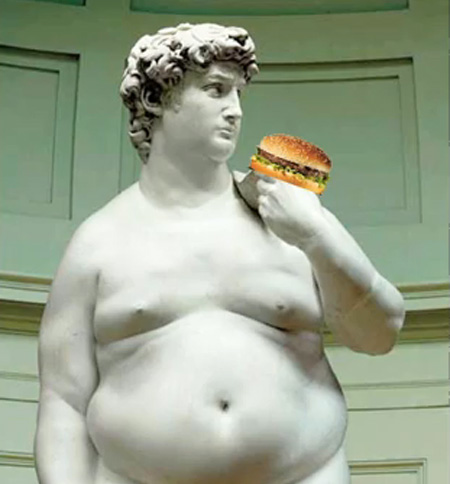
Having spent months intensively reading this literature (and years perusing it), what's my bottom line? What do I actually eat?
Here's my bottom line: the foods that actually go into my mouth.
(Here: I must caution you. What I eat is in large part determined by my own athletic lifestyle, writing schedule, and occasionally finicky gut. So, for example, I'll never eat a load of protein if I'm sitting down to write — the work of digestion dulls me out (like a lion sleeping after eating a zebra). Also, these days I mainly eat salad and veggies. But, if I'm going for a long bike ride, I don't want that bulk in my stomach — then, I'm just going to eat an apple and some nuts.
If I had a heart attack, I'd probably be eating almost 100% vegetables and salads, as advocated by Ornish, Gupta, Fuhrman, and Esselstyn above. (I believe them! So, does Hillary's ex-president husband.) I really keep the meat (other than fish) to a minimum. Here's my food list.
1) FISH: SARDINES, MACKEREL
Rationale: They're tasty. Those cans of sardines or mackerel are cheap. They kill my appetite. Sardines and mackerel are not top predators like salmon, so they're far less apt to contain mercury or halogenated hydrocarbons. I occasionally eat wild-caught salmon, but it's expensive (unless you buy the cans), and is more apt to contain mercury. (Tuna is similar, but less expensive.) I dislike the fact that eating salmon is not globally sustainable. I'm convinced that fish has been part of a hominin diet for millions of years.
Fatty fish are high in omega-3 fatty acids. With all that DHA, fish is pure brain food. Or, as my mother used to say, fish is bene-fish-al .
How about legumes like soy beans or soy burgers instead of fish? Not for me. You may be ok with them. But, in addition to the arguments against soy made by the Jaminets and others, I simply cannot tolerate a lot of soy and most other beans.
Here's a key principle of the foods I eat.
Do not eat any foods that cause you problems! If a food gives you gas, bloating, diarrhea, constipation, low energy (or whatever), dump it! Forget whatever the literature says. That's just theory.
2) CHICKEN
(Note: this has changed since I initially wrote this article in 2012.) I've really cut down on chicken — just occasional chunks in salads. (Meat, fish, and fowl are loaded with purines and are metabolized to uric acid — a big problem, if you've had kidney stones — like I've had. )
3) EGG WHITES (and occasionally, yolks)
Rationale: High protein, easy to digest. I make hard-boiled eggs every couple of weeks, and usually, but not always, throw away the yolks. Each yoke contains about 300 mg of cholesterol: way too much. I'm familiar with the argument that dietary cholesterol is irrelevant. I'm not sure. I do think that dietary cholesterol may be less harmful than dietary saturated fat, but the two co-occur in many foods. Dietary cholesterol does correlate poorly with blood cholesterol, but that doesn't justify ignoring LDL-cholesterol, as claimed by some Paleo bloggers (see my note to Stephan Guyenet, below. ) Egg yolks, meat, and fish do contain choline, a trimethylamine that is essential for brain health - choline is a precursor of the neurotransmitter acetylcholine.
But note this — link to atherosclerosis!
I used to take phosphatidyl choline supplements — I threw them away after reading the last reference.
That's it for overtly protein foods. Note: daily protein intake should be no more than about one to two grams per kg of body weight per day. Occasionally I go up to two mg/kg/day, like the body builders. (By the way, Dr. Fuhrman, makes the point that vegetables are also protein foods — what do you think horses and elephants are made of? I was somewhat persuaded by Loren Cordain's argument that animal protein is more easily digested Nonetheless, the evidence provided by the 7th Day Adventists and other vegetarian advocates cannot be ignored.)
Again, the diet I always strive to achieve is like that advocated by Dean Ornish or by Caldwell Esselstyn for Bill Clinton, but it's hard to pull off. (I'll let you know when and if the Paleo crowd does a study like Ornish's — only showing that unlimited saturated fat (as the paleos advocate) leads to regression of atherosclerosis. They haven't, and they can't — that's my bet.
Here's another quote from my mother (a rabbi's daughter and career public health nurse, who died at age 91.)
"Pastrami killed more Jews than Hitler!"
4) NUTS: Almonds, Walnuts, Cashews, Macademias
Rationale: tasty, compact for hiking and biking, nongreasy (unlike animal fats), source of PUFAs and MUFAs. But need to be carefully rationed. Easy to overdo and loaded with fat. The MUFA wiki contains a handy table of fat content in various foods. (Go to the section called Natural Sources and click on the link " Fat composition in different foods .") Among the nuts, walnuts contain the most PUFAs. But, if you're not worried about satfats, then also eat the others. As Bill Lands pointed out in his lecture above, peanuts are loaded with omega-6 fatty acids (the pro-inflammatory insurgents), so only occasional peanuts or peanut butter for me (the staple of my youth). I also recommend restraint with macademia nuts. They're loaded with palmitoleic acid, which elevates LDL cholesterol. By the way, roasted flaxseeds taste great on salads.
5) AVOCADOS and OLIVES
Rationale: tasty, good source of MUFAs, staple of Meditteranean diets, nongreasy. Need to be carefully rationed. Loaded with fat - not for everyday consumption. By the way, if you insist on a salad dressing, the universally agreed upon choice uses extra-virgin olive oil (high in oleic acid (MUFA) content.)
6) FRUIT: APPLES and oranges, lemons, blueberries, raspberries, etc.
Rationale: tasty, good source of carbs but need to be carefully rationed . These little bags of sugar are seductive. I almost never buy grapes, for example. I'm like a dog — if I buy a week's worth of grapes, they're gone in ten minutes. Fruit needs to be carefully rationed. Modern fruit bears no resemblance to the wild varieties that our paleolithic ancestors ate. Compare a giant, sweet modern apple to a scrawny, crab apple, and you get the idea.
My guess is that the medical establishment's recommendation to eat lots of fruits and vegetables, gets translated to "eat lots of fruit." (What do you think? Are people eating kale and broccoli or apples and oranges?) If you're trying to lose weight, fruit is a huge mistake. As an experiment, cut the fruit out entirely for awhile.
7) SALADS: Romaine, Spinach
Rationale: After listening to Joel Furman's lectures, I thought "yes, three big heaping plates of salad per day. " At first, I tried but just couldn't do it. (2016: update: I now mainly eat salads and vegetables.) Note, Dr. Furman makes the point that there's absolutely no point in putting 500 calories worth of dressing on a 5 calorie salad. As he says, why not just skip the salad, and drink the dressing straight out of the bottle? I occasionaly use marinara sauce on my salads instead of any oil or mayonnaise-based dressings.
Dr. Furman loves beans. He jokes about the gas problem. (It is a problem. I mainly stay away from beans.)
8) VEGETABLES: Sweet Potatoes, Carrots, String Beans, Peas
Rationale: Sweet potatoes are an idea from the traditional Okinawan diet. They're great. I slice them thin and microwave them for about 3 minutes. I eat them with some seasoning salt.
My vegetables are typically frozen (a convenience thing). I pour them into bowls in the regular section of the fridge and then defrost for 24 hours. I then eat them raw.
I'd love to be able to eat crucifers (broccoli, brussel sprouts, cabbage) with all those wonderful anticarcinogens. If you can, go for it. I've tried all the tricks. My tolerance is limited. Apparently, this is a problem shared by Big Bang’s uber-nerd Sheldon Cooper, as he tries to go on an all-crucifer diet, desiring to live long enough to do a mind upload to a post-Singularity mainframe.
President George H. W. Bush, senior — the smarter one — was also famous for his hatred of broccoli .
9) Rice and Rice Cakes
Rationale: Most people on the planet have no digestive problems with rice. It lacks the antigens present in the other grains like wheat and barley. Rice is a staple in Asian diets, especially the Okinawan diet described above. But watch it! Rice, even brown rice, is high-glycemic.
I never cook rice. I don't want to eat that much. It's easier to titrate as rice cakes or rice crackers. I eat a gluten-free diet.
10) WATER
I drink distilled water. Our municipal water, which comes from Sierra snowmelt, is pretty good. But, by the time it gets to me, it tastes like iron from the pipes. The snowmelt I drink in the Sierras every August tastes much more like my distilled water.
Note: drinking distilled water is a double-edged sword. The good aspect is that most toxins and pollutants are removed. The bad part is that all the dissolved minerals are also removed. The ones that you really must monitor and maintain are magnesium and calcium. You must either get those from food or from supplements. See this info from Lenntech: Demineralized water FAQ and Demiwater and Health and Calcium and Magnesium in Drinking-water (WHO) .
(Also see my article on supplements I take. (My vitamin D is mainly from walking shirtless on warm days. But, don't overdo it! Melanoma is worse than having low vitamin D.) Most supplements are useless or worse. Get your vitamins from food! Here, I discuss the difficulty of determining whether a drug or supplement actually works. Most of them do not!
And a note on dairy foods. Most people on the planet have lactose intolerance. But, even if you don't, I'd still exercise great restraint with dairy. It was not a part of the paleolithic diet, as Loren Cordain emphasizes. Furthermore, it's loaded with satfat.
Please recall the interview I linked to above with renowned lipoprotein pioneer Ron Krauss who recommends limiting satfats to 10% of calories. Furthermore, please recall the 2007 meta-analysis analyzed by Sir Richard Peto involving 900,000 patients that found a large correlation between high cholesterol and cardiac death.
As I Iook at what I actually eat, it looks far more like a Loren Cordain Paleo diet than a complex carb, ultra-low fat vegetarian diet a la Dean Ornish. But please note — this is heavily influenced by what happens to work best for me . Maybe that's a key fact that has been exposed by the Paleo advocates like Gary Taubes and Loren Cordain. That's part of what motivated this article (the difference between theory and practice). Achieving an optimal diet is not simple. It needs to be carefully tailored by each of us to our own circumstances, tastes, and tolerances.
To your health. Live long and prosper!
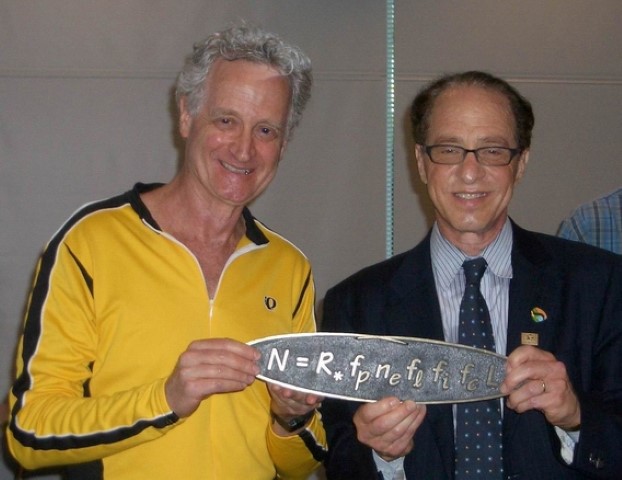 With Ray Kurzweil at the SETI Institute.
We're holding the Drake equation. Ray was a classmate of mine at MIT in the 1960's.
Like Ray, I'm enthralled by the accelerating pace of information technology and biomedical research.
Longevity enables me to take advantage of new research innovations.
It's never been easier — the world's knowledge is at your finger tips.
With Ray Kurzweil at the SETI Institute.
We're holding the Drake equation. Ray was a classmate of mine at MIT in the 1960's.
Like Ray, I'm enthralled by the accelerating pace of information technology and biomedical research.
Longevity enables me to take advantage of new research innovations.
It's never been easier — the world's knowledge is at your finger tips.
(Substantive comments may be emailed to bob AT bobblum DOT com. With your permission excerpts may be posted here.)
In 2012 I sent the following letter to Stephan Guyenet, PhD (a popular health guru (and legitimate, university-based researcher.)) Dr. Guyenet studies lipoprotein metabolism and its relationship to neural regulation of appetite. He runs a popular website, Whole Health Source, dealing with these issues. His post here focused on the satfat issue and prompted my letter, below, to him.
Hi Stephan,
A few of my friends are fans of your nutrition website. I also appreciate your scholarly analyses of these important issues.
I'm an MD, PhD, career emergency physician and former Stanford researcher — now back on campus studying cognitive neuroscience.
I wanted to sort out the statin/ saturated fat issues for myself to see where the literature stands. The above essay is the result.
Here's why I'm writing. Thousands of articles in the literature support statin efficacy.
Do you deny that efficacy or explain it via other mechanisms? Did I miss an essay of yours dealing with that issue? (My suspicion is that you, Chris Kresser, and the other health bloggers have this wrong — although many of your sub-claims seem correct (on insulin, n3/n6 etc.) Similarly, with LDLc, I note that Chris Kresser disparages it (and you seem to, also.)
So, how do you account for Ron Krauss's admonition to limit satfat to 10% of calories in this interview. Or, this consensus paper (supported by the national dairy councils!!) that warns about satfats and LDLc.
Or, this one by Sir Richard Peto surely, no slouch!)
Did I miss your response to these articles in your blog? Just trying to keep you out of trouble!Best wishes, Bob — www.bobblum.com
And here was Dr. Guyenet's response.
Hi Dr. Blum,
Thanks for your message. My position is that LDL — most likely oxLDL (oxidized LDL), but I can't be 100% confident that native LDL does not play a role — contributes to atherosclerosis and thus the likelihood of having a heart attack.
Statins are effective preventative agents against heart attacks in high-risk groups (particularly secondary prevention in men), probably via a mechanism involving LDL reduction and suppression of inflammation(statins are anti-inflammatory and have shown efficacy against rheumatoid arthritis for example). Statins also have negative side effects including increased risk of myopathy, cognitive problems and diabetes.
Atherosclerosis, as far as I can tell, is primarily an inflammatory disorder, and the primary inflammatory agent is excessive oxidized lipoproteins with insufficient reverse cholesterol transport via HDL. But there are probably many other inflammatory factors that can contribute to the process.
Regarding the effect of SFA (satfat) on atherosclerosis and CHD risk, I continue to maintain that a significant role in humans has not been established.
A recent meta-analysis by Ronald Krauss's group concluded there is no significant evidence for concluding that dietary saturated fat is associated with an increased risk of CHD or CVD. SFA increases LDL cholesterol content (not necessarily particle number) in the short term, but apparently not oxLDL and they also increase HDL. Therefore, the effect of SFA on LDL cholesterol content cannot be used in isolation to predict its effect on CHD risk. What we need to consider are studies that examine the effect of SFA on CHD risk directly. These have been conducted, and they largely indicate that SFA reduction is ineffective for CHD prevention, particularly when it is replaced by n-6 rich refined seed oils.
I have no doubt that a simple, unprocessed, high-fiber, low-fat plant-based diet would lower CHD risk relative to what most people eat today. Therefore I am not at all surprised by the apparent results of Ornish, Esselstyn etc, although I think that scientifically, they really have not rigorously established that their interventions work. My position is that this kind of diet would be better for overall health if it included more animal foods and focused on starchy root vegetables to a greater extent than grains, and this would still be consistent with excellent cardiovascular health. But I have nothing against a low-ish fat diet that contains only a small amount of meat/fish/dairy/eggs as long as it is well composed (no white flour, seed oils, refined sugar, processed food, grains and legumes prepared according to traditional methods). And I certainly have nothing at all against unrefined carbohydrate.
Cheers, Stephan
(author of above letter to me — Stephan J. Guyenet, Ph.D.; Senior fellow ; University of Washington : Division of Metabolism, Endocrinology and Nutrition)
I always welcome substantive comments on this and all my essays. With your permission I may include excerpts here.